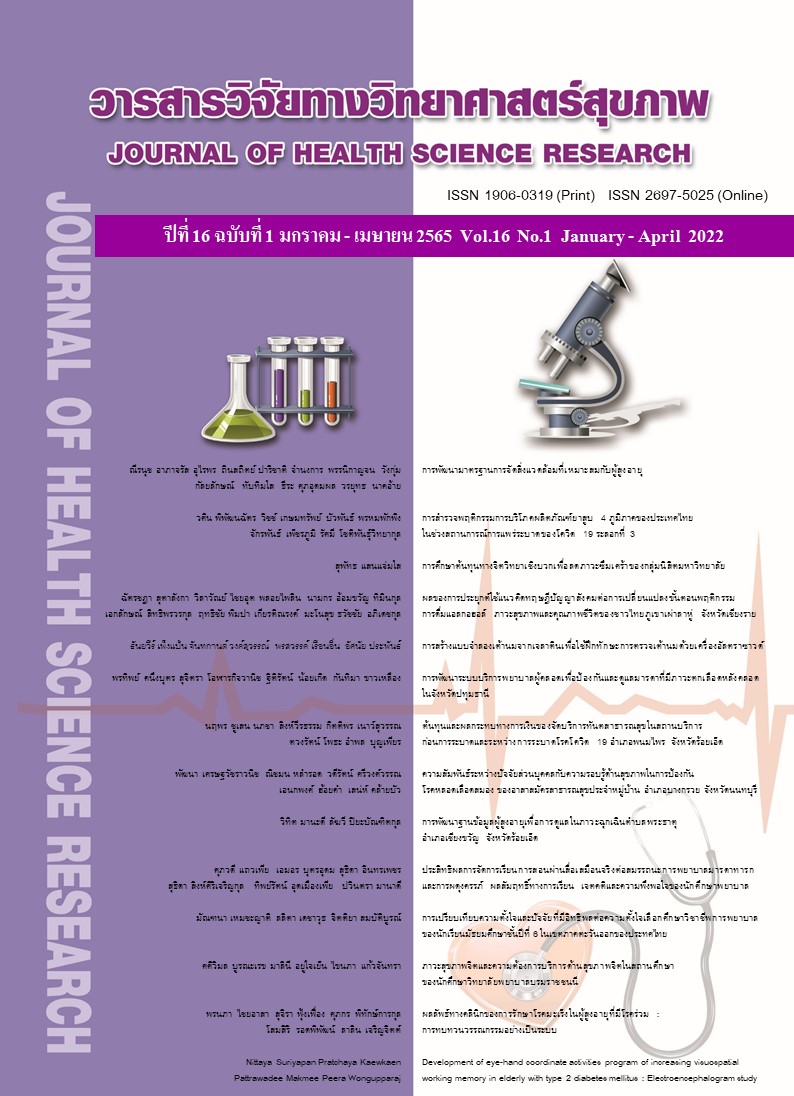ผลของการประยุกต์ใช้แนวคิดทฤษฎีปัญญาสังคมต่อการเปลี่ยนแปลงขั้นตอนพฤติกรรมการดื่มแอลกอฮอล์ ภาวะสุขภาพและคุณภาพชีวิต ของชาวไทยภูเขาเผ่าลาหู่ จังหวัดเชียงราย
Main Article Content
บทคัดย่อ
บทนำ : ชาวไทยภูเขามีหลายเทศกาลที่เกี่ยวข้องกับการดื่มแอลกอฮอล์ซึ่งเริ่มตั้งแต่วัยรุ่น การดื่มแอลกอฮอล์ส่งผลกระทบต่อสุขภาพร่างกายและจิตใจ รวมถึงปัญหาครอบครัวและสังคม
วัตถุประสงค์การวิจัย : เพื่อศึกษาผลของการประยุกต์ใช้แนวคิดทฤษฎีปัญญาสังคมต่อการเปลี่ยนแปลงขั้นตอนพฤติกรรมการดื่มแอลกอฮอล์ ภาวะสุขภาพและคุณภาพชีวิตของชาวไทยภูเขาเผ่าลาหู่ จ. เชียงราย
วิธีการวิจัย : การศึกษากึ่งทดลอง ตัวอย่างเป็นชาวไทยภูเขาเผ่าลาหู่ เป็นผู้ดื่มสุราไม่น้อยกว่า 6 เดือน อายุ 16-65 ปี จำนวน 65 คน ตัวอย่างได้รับโปรแกรมการปรับพฤติกรรมการดื่มแอลกอฮอล์โดยประยุกต์ใช้แนวคิดทฤษฎีปัญญาสังคม 7 กิจกรรม ใช้ระยะเวลา 4 สัปดาห์ และประเมินการเปลี่ยนแปลงขั้นตอนพฤติกรรมการดื่มแอลกอฮอล์ ระดับความความเสี่ยงการติดแอลกอฮอล์ ประเมินภาวะสุขภาพ และประเมินคุณภาพชีวิตก่อนและหลังเข้ารับโปรแกรม วิเคราะห์ข้อมูลด้วยสถิติเชิงพรรณนา และสถิติทดสอบทีคู่
ผลการศึกษา : หลังเข้าร่วมโปรแกรม การเปลี่ยนแปลงขั้นตอนพฤติกรรมการดื่มแอลกอฮอล์ดีขึ้น นอกจากนี้ระดับความเสี่ยงการติดแอลกอฮอล์ ความคล่องแคล่วทางภาษาและความจำ (p<.001) ความทนทานของระบบหัวใจและไหลเวียนโลหิต (p<.05) และคุณภาพชีวิต (p<.001) แตกต่างอย่างมีนัยสำคัญทางสถิติก่อนเข้ารับโปรแกรม
สรุปผล : โปรแกรมการลดการดื่มแอลกอฮอล์โดยประยุกต์ทฤษฎีปัญญาสังคมมีผลต่อการปรับเปลี่ยนพฤติกรรมการดื่มแอลกอฮอล์ ส่งเสริมภาวะสุขภาพและคุณภาพชีวิตในชาวไทยภูเขาเผ่าลาหู่ ในการศึกษาต่อไปควรมีการติดตามผลของโปรแกรม เพื่อนำไปสู่การพัฒนาที่ยั่งยืน
Downloads
Article Details

อนุญาตภายใต้เงื่อนไข Creative Commons Attribution-NonCommercial-NoDerivatives 4.0 International License.
บทความที่ได้รับการตีพิมพ์เป็นลิขสิทธิ์ของวิทยาลัยพยาบาลบรมราชชนนี จังหวัดนนทบุรี
ข้อความที่ปรากฏในบทความแต่ละเรื่องในวารสารวิชาการเล่มนี้เป็นความคิดเห็นส่วนตัวของผู้เขียนแต่ละท่านไม่เกี่ยวข้องกับวิทยาลัยพยาบาลบรมราชชนนี จังหวัดนนทบุรี และคณาจารย์ท่านอื่น ในวิทยาลัยฯ แต่อย่างใด ความรับผิดชอบองค์ประกอบทั้งหมดของบทความแต่ละเรื่องเป็นของผู้เขียนแต่ละท่าน หากมีความผิดพลาดใด ๆ ผู้เขียนแต่ละท่านจะรับผิดชอบบทความของตนเองแต่ผู้เดียว
เอกสารอ้างอิง
National Statistical Office Thailand. The smoking and drinking behavior survey 2017. Bangkok: Pimdeekarnpim; 2018.
(in Thai).
Wongchaum P. The relationship among knowledge, attitude and alcohol drinking behaviour of students in regular study programs at Burapha University. [Dissertation]. Chon Buri: Burapha University; 2014. (in Thai).
Detpetukyon S, Apidechkul T, Sunsern R, Anuwatnonthakate A, Singkhorn O, Putsa B, Thutsanti P. Patterns and perception of alcohol drinking among the Lahu people, Northern Thailand. J Health Res. 2018; 32(3): 185-97. doi: 10.1108/JHR-05-2018-020.
Kendzor DE, Dubbert PM, Olivier J, Businelle MS, Grothe KB, PATHS Investigators. The influence of physical activity on alcohol consumption among heavy drinkers participating in an alcohol treatment intervention. Addict Behav. 2008;33(10):1337-43. doi: 10.1016/j.add beh.2008.06.013.
Glanz K, Rimer BK, Viswanath K, eds. Health behavior and health education: Theory, research, and practice (4th ed). San Francisco: Jossey-Bass; 2008.
Kongsut P, Chaisri S, Teangtum S. The development empowerment program on management with drinking behavior of alcohol dependence patients. The Journal of Psychiatric Nursing and Mental Health. 2013;27(1):45-61. (in Thai).
Saunders JB, Aasland OG, Babor TF, de la Fuente JR, Grant M. Development of the Alcohol Use Disorders Identification Test (AUDIT): WHO collaborative project on early detection of persons with harmful alcohol consumption. II. Addiction. 1993;88: 791-804. doi: 10.1111/j.1360-0443.1993.tb02093x.
Etherton JL, Bianchini KJ, Greve KW, Heinly MT. Sensitivity and specificity of reliable digit span in malingered pain-related disability. Assessment. 2005;12(2):130-6. doi: 10.1177/1073191105 274859.
Charernboon T. Verbal fluency in the Thai elderly, elderly with mild cognitive impairment and elderly with dementia. Journal of Mental Health of Thailand. 2018;26(2):91-102. (in Thai).
Anees W, Gannon PF, Huggins V, Pantin CF, Burge PS. Effect of peak expiratory flow data quantity on diagnostic sensitivity and specificity in occupational asthma. Eur Respir J. 2004;23:730-4. doi: 10.1183 /09031936.04.00027304.
Sirthawong A, Poncumhak P, Sungkamanee S, Manoy P, Boonla O. The optimal cut-off score of the 2-minute step test for prediction of cardiopulmonary endurance in older adults with hypertension. Srinagarind Medical Journal. 2019;34(2): 161-8. (in Thai).
Shumway-Cook A, Brauer S, Woollacott M. Predicting the probability for falls in community-dwelling older adults using the Timed Up & Go Test. Phys Ther. 2000;80 (9):896–903. doi: 10.1093/ptj/80.9.896.
Lee S, Dajpratham P. Criterion validity of the Thai version of the PHQ-9 and the PHQ-2 for screening major depression in Thai elderly. Journal of Thai Rehabilitation Medicine. 2017;27(1):30-7. (in Thai).
Apidechkul T. Comparison of quality of life and mental health among elderly people in rural and suburban areas, Thailand. Southeast Asian J Trop Med Public Health. 2011;42(5):1282-92.
Meehanpong P, Chatdokmaipra K. Assessing quality of research instrument in nursing research. Journal of The Royal
Thai Army Nurse. 2018;19(1):9-15 (in Thai).
Garrin JM. Self-efficacy, self-determination, and self-regulation: the role of the fitness professional in social change agency. J Soc Change. 2014;6(1):41-54. doi: 10.55 90/JOSC.2014.06.1.05.
Srikitvilaisak N, Mongkolsomlit S. The effective of a behavioral change program in low risk drinking or hazardous drinking individuals. The Public Health Journal of Burapha University. 2016;11(1):39-51. (in Thai).
Jones CL, Jensen JD, Scherr CL, Brown NR, Christy K, Weaver J. The Health Belief Model as an explanatory framework in communication research: exploring parallel, serial, and moderated mediation. Health Commun. 2015;30(6):566-76. doi: 10.1080/ 10410236.2013.873363.
Kamonpornmongkol J, Homsin P, Srisuriyawet R. Effects of self-efficacy enhancement on drinking refusal self-efficacy, outcome expectancy and skills among male primary school students. The Public Health Journal of Burapha University. 2012;7(2):84-99. (in Thai).
Devenney LE, Coyle KB, Verster JC. Memory and attention during an alcohol hangover. Hum Psychopharmacol. 2019; 34(4):e2701. doi: 10.1002/hup.2701.


